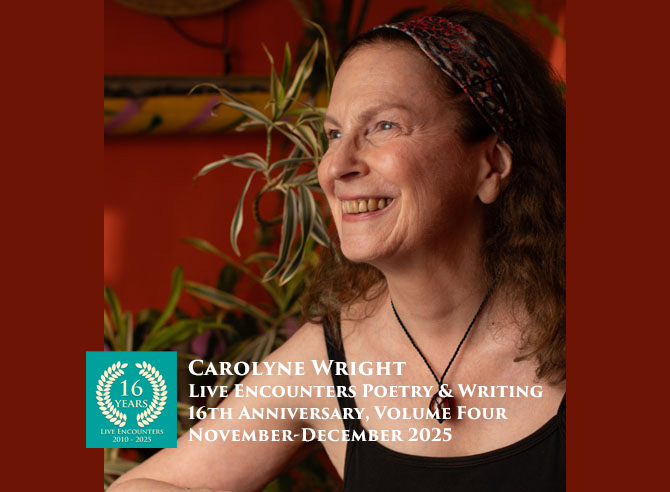
Download PDF Here
Live Encounters Poetry & Writing 16th Anniversary Volume Four
November- December 2025
The Eigerwand Coffeehouse, poems by Carolyne Wright.
The Eigerwand Coffeehouse
“What we are to be, we are now becoming”
–Theodore Roosevelt High School motto
We were sixteen, invincible and deadhead
deep in the centrifugal cycle of our first lycergic spin.
Polly, Lesley, and little me: we sashayed in, wild thangs
out on the town, our day-tripper faces
veering toward evening, high on a hectic blush.
Our salivary glands shot into dry dock,
we ground our teeth on the mind’s
molasses gravel as if it were party mix.
What else did you expect?
We were making the scene, three stoned chicks
in the Ave’s oldest magic-mushroom hangout,
and we couldn’t wrap our minds around
the come-down dusk. Out for the trip
and nothing but the trip, we were nubile
but not quite fixing to be jail-bait,
our nipples poking through luna-moth
gauze and mandala-pattern silk.
We jostled onto a thronged bench
along the long tables’ knife-gouged planks
and let the hairy eyeballing begin.
Those who ogled us: psilocybin-eyed
malingerers and languid undraftables
hunched over chess boards in a craze
of windowpane; Joni and Janis wannabees
with butterfly tattoos and waterfall
manes, their pout-lips feigning disaffection—
everyone a vision-quester or Lotos-eater
of passion-petal hash. Desire kaleidoscoped
our brains, our reflexes webbed with spun-sugar
filaments, our sense of perspective overwhelmed
as if we were stumbling among crumbling
basalt pillars in Fingal’s Cave.
Then
a water glass shattered
on the concrete floor and
the room stopped.
The tablesful of chessmen stunned to a catatonic
shudder, the hippie mamas’ tongues
stubbed in acid’s afterglow. The loaded dudes
and dudettes flipped their fright wigs,
fingered their threads’ bare pockets
for the damning stash, just in case
this was the first foray of Seattle’s
Finest out on their twice-weekly
bust-o-rama.
Meanwhile, crash echoes
radiated, concentric aftershocks,
the glass-shard tinkle bending the noise
around galactic absences.
Such an antidote to light.
Heavy,
we groaned. Our eyes—when we glanced
into one wall’s rippled floor-to-ceiling mirror—
were huge and crystal-meth blue with translucent veins
looming through them in a molten dream.
We fled then, my acid-head girlfriends
splitting like rhythm’s sisters for their custom
villas in Windermere, jingling the keys
to daddy’s Porsche like family jewels.
They dropped me at the bus stop and vroomed off
to slum among the head shoppes. Not
me, man—I told myself—not this prophetess,
as I clambered aboard the View Ridge bus
like Jonah splitting from Nineveh.
I was nobody’s scioness or satin doll,
sprung from no power broker’s inner
thighs. I couldn’t turn on, tune in, drop out
and still count on an ancestral bequest
or bespoke trousseau as fallback.
Upwardly mobile and self-propelled,
I had to head home, come down, and get
my grades up. Get my head around
those flashes of gamma oscillation
blowing in to my meditator’s brain.
Whatever I was to become
I’d have to get there on my own.
Nostalgia
(In memory of Jim)
This poem
is not about
the moon.
It is about the day
that you and I
walked
into the garden
where
the snowman stood
with his icy frill of willow twigs
and his walnut
eyes
staring us down
as if our places
had been changed
and he could return
to his abode of snows
thinking
in the shivered
crystal of his brain,
Himalaya Himalaya Himalaya
© Carolyne Wright
Carolyne Wright’s most recent books are Masquerade, a memoir in poetry (Lost Horse Press, 2021), and This Dream the World: New & Selected Poems (Lost Horse, 2017), whose title poem received a Pushcart Prize and appeared in The Best American Poetry. She has nine earlier books and chapbooks of poetry; a ground-breaking anthology, Raising Lilly Ledbetter: Women Poets Occupy the Workspace (Lost Horse, 2015), which received ten Pushcart Prize nominations; and five award-winning volumes of poetry in translation from Bengali and Spanish—including Map Traces, Blood Traces / Trazas de mapa, trazas de sangre (Mayapple Press, 2017) by Seattle-based Chilean poet, Eugenia Toledo (Finalist, 2018 Washington State Book Award in Poetry, and 2018 PEN Los Angeles Award in Translation).
A Contributing Editor for the Pushcart Prizes, Carolyne lived in Chile and traveled in Brazil on a Fulbright Grant; on her return, she studied with Elizabeth Bishop at the University of Washington. Carolyne returned to Brazil in 2018 for an Instituto Sacatar artist’s residency in Bahia. A Seattle native who teaches for Richard Hugo House, she has received grants from the NEA, 4Culture, and the Radcliffe Institute, among others. A Fulbright U.S. Scholar Award to Brazil took her back to Salvador, Bahia, in 2022 and 2024.


